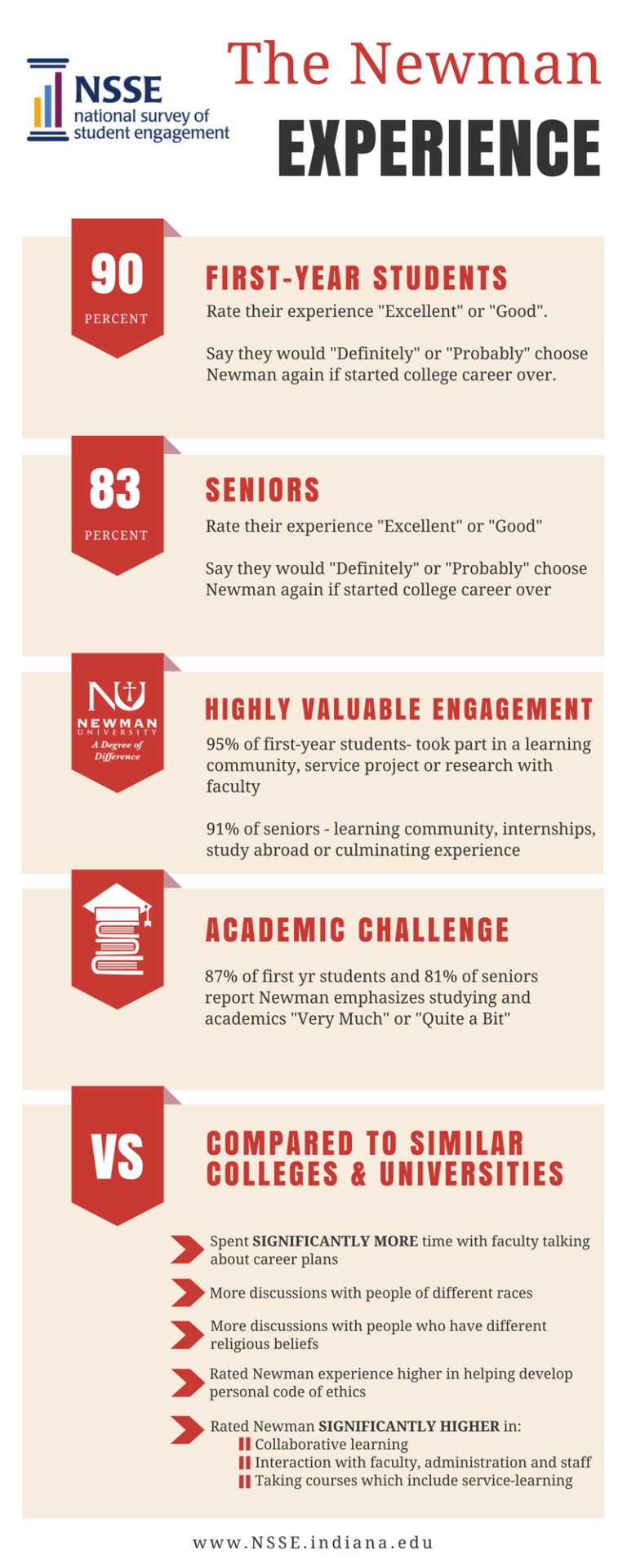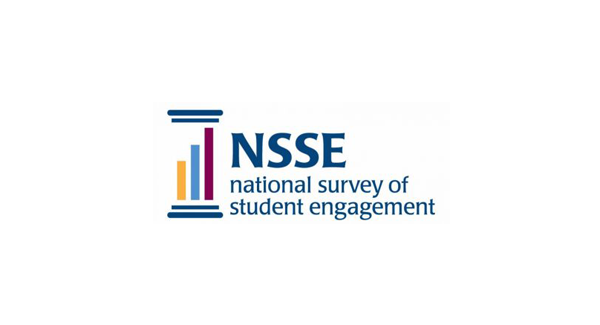High school juniors and seniors looking for a college where they will be challenged to do their best work, have multiple opportunities to participate in service-learning activities, enjoy positive interactions with faculty and staff, and work with a diverse mix of fellow students in supportive learning communities may want to consider Newman University. Newman students are challenged academically, engaged socially, and satisfied with their choice of college, according to findings in the just-released official report of the 2016 National Survey of Student Engagement (NSSE).
The NSSE is an annual survey of university freshman and senior students at hundreds of four-year colleges and universities, which is designed to measure students’ engagement with activities that promote effective learning and personal development. Students who participate in the survey are asked to reflect on the time and effort they devote to various learning activities, and on the resources, courses and other learning opportunities the institution they attend provides that facilitate participation and learning.
For the 2016 survey, 147 first-year and senior Newman students responded to questions related to Academic Challenge, Learning with Peers, Experiences with Faculty and Campus Environment. Studies have shown that high levels of engagement in these areas typically lead to high levels of student learning, satisfaction and graduation rates.
Among the highlights of the survey:
- 90 percent of first-year Newman students and 83 percent of senior Newman students rate their experience at Newman as “Excellent” or “Good.”
- 90 percent of first-year students and 83 percent of seniors would “Definitely” or “Probably” choose Newman again if they could start their college careers over.
- 95 percent of Newman first-year students participated in a learning community, service project or research with faculty, while 91 percent of seniors participated in similar learning activities, as well as internships, study abroad programs and culminating senior experiences.
- 86 percent of first-year students and 81 percent of seniors said Newman emphasizes studying and academics “Very much” or “Quite a bit.”
“We’re very pleased with the results of the 2016 survey,” said Newman Provost and Vice President for Academic Affairs Kimberly Long, Ph.D. “Students come to Newman with high expectations. They want to go on to graduate schools and medical schools, and feel that Newman prepares them academically to succeed.”
Newman students’ results are also compared to those of a consortium of Catholic colleges and universities, a group of schools that are similar in size and location as Newman, as well as all NSSE 2015 and 2016 participants in the United States. First-year students showed significantly higher results in several key areas.
Compared to students in other schools, Newman first-year students:
- Spent significantly more time talking about career plans with faculty
- Worked with faculty on activities other than coursework (research, trips, etc.)
- Were assigned more papers, reports or other writing tasks
- Were engaged in more discussions with people of different race or ethnicity than theirs
- Were engaged in more discussions with people who have different religious beliefs than theirs
- Had more courses that include a community-based project or service-learning aspect
- Reported “Excellent” or “Good” experiences with faculty
- Had high-quality interaction with administrative staff and offices
- Spent more hours per week on co-curricular activities
Compared to senior students in other schools, Newman seniors showed significantly higher results in:
- Participation in learning communities
- The development of a personal code of ethics because of their experience at Newman
- “Excellent” or “Good” experiences with faculty
When compared to just the consortium of Catholic colleges and universities, Newman first-year students scored:
- 28 points higher on taking courses that included service-learning
- 20 points higher on working with other students to prepare for exams
- 20 points higher on the quality of interaction with school staff and offices
Newman senior students scored:
- 15 points higher on participating in a learning community
- 8 points higher on discussions with people of different race or ethnicity than theirs
- 7 percent higher on discussing their academic performance with faculty
Other notable findings in the survey include:
- First-year Newman students spent 13.0 hours per week preparing for class; seniors spent 15.4 hours
- First-year students spent 5.8 hours per week reading and writing; seniors spent 8.9 hours
- First-year students were assigned an average of 66.4 pages of writing a year; seniors were assigned 88.8 pages.
The National Survey of Student Engagement has been in operation since 2000 and has been used at more than 1,600 colleges and universities in the United States and Canada. The survey is conducted by the Indiana University Center for Postsecondary Research, Bloomington, Ind. About 311,000 students from 537 institutions in the United States and Canada participated in the 2016 survey. For more information, visit the NSSE web site at www.nsse.indiana.edu.



